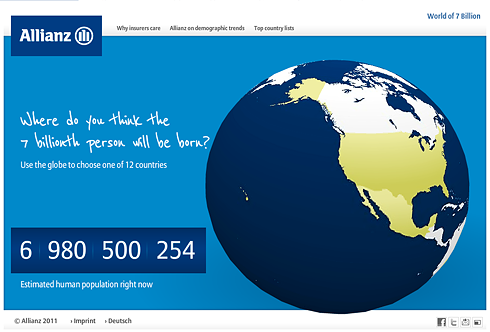The countdown for the birth of the earth's seven billionth inhabitant has begun. Just twelve years after the six billion mark was reached, the United Nations has predicted that the seven billionth new addition to the human race will be born on October 31, 2011. His or her birth will be a milestone in world history but also poses a challenge for our planet.
We will soon be seven billion
Never before has the earth been home to so many people at once. It also raises some existential questions. What lies in store for our Billion Child. Assuming it is a girl, what kind of conditions will she grow up in? Will she have enough essentials such as food and clean drinking water? What will her life expectancy be?
Allianz has been dealing with these and many other questions for years and on the occasion of this historical event is publishing an informative feature on its internet pages. Presented in a question-and-answer format, the feature is also linked to social media.

At the heart of the new Allianz internet feature on population growth is an interactive animation that shows in question-and-answer format demographic trends of the next centuries. Note to online editors: below you can download the animated feature as a white label version (without logos) for your own use.
Animation and download
"As an international financial provider, we keep a close eye on demographic change, because it has a fundamental influence on future economic and financial market trends. In addition, we would like to pass on our knowledge to our customers and the public in an easily understandable form," explains Michaela Grimm, Senior Economist at Allianz in Munich.
Will the seven billionth human be born in Germany?
258 babies are born every minute. However, it makes a significant difference where a child is born. Statistically, a child born today can expect to live for at least 68 years.
Thanks to medical advances children born in Germany can look forward to celebrating their 80th or even their 90th birthday. That's a dramatic improvement compared to the period just after World War II.
However, because of the low birthrate it looks pretty unlikely that the Billion Child will be born in Germany, only a 0.5 percent probability. Currently Africa, Asia and Latin America have the highest birth rates, and demographic experts expect the historic child to come into the world in India.
"We assume that most children will be born in India this year. In fact, India is set to overtake China as the most populous country within the next ten years," says Grimm.
Birth rate continues to rise
The birth of the new Billion Child will certainly be a joyful and momentous event. Nevertheless, it represents only a pause for thought against the backdrop of global population trends.
At the moment, demographic experts cannot predict exactly when the ten billionth child will be born. According to the latest calculations by the United Nations, it could occur in 2100.
What we do know, however, is that it will happen, because the world's population will continue to grow. "New approaches and unprecedented levels of global cooperation are needed to ensure that this child grows up in a world that offers at least the same opportunities as you enjoy today," says Grimm. "We've presented the issue on our website with an interactive application that is easy for anyone to understand - because it's an issue that concerns us all."
As with all content published on this site, these statements are subject to our Forward Looking Statement disclaimer.
Link to the disclaimer